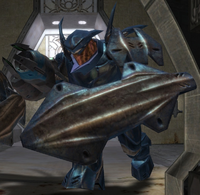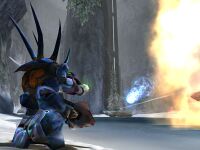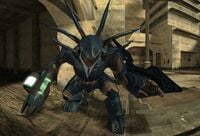Lekgolo
From Halopedia, the Halo wiki
Template:Covenant Species Infobox
The Lekgolo[1] are a species of unified sentient eel conglomerates in the Covenant government. They are called Hunters by the United Nations Space Command. Hunters stand anywhere from nine and a half to twelve feet tall, but when in their combat state they crouch to approximately eight feet, making their weak spots smaller. Hunters fight with Fuel Rod Guns (Halo 1) and a modified Fuel Rod Cannon (Halo 2) integrated directly into their armor, and they carry an enormous and nearly-impervious metal shield made of an unknown alloy as thick as the armor plating on Covenant Starships, which they sometimes use as a melee weapon. The modified Fuel Rod Cannon used in Halo 2 is similar to the modifications Cortana made to Ascendant Justice's weapons. The fire is more sustained, and more devastating.
According to Halo 2 the Hunters needed to be tamed and an Arbiter played a significant role in their taming.
During the Civil War of the Covenant, the Hunters took the side of the Elites.
Culture
Hunters almost never associate, or even communicate, with other Covenant client races, save for the Elites. They are dismissive, scornful, and arrogant to the "lesser" Covenant races, and are utterly contemptuous of their foes.
Hunters were forced into the Covenant by the superior starship technology of the Elites - on the ground they were mostly, if not always, victorious. Faced with extinction by orbital bombardment, they joined the Covenant. It is assumed that this is when an Arbiter was killed, that this was the time of the Taming of the Hunters.
Hunters have three names: personal name, bond name, and line name. The personal name is given at birth. The line name represents the genetic heritage, being the name of the most successful Hunter of his ancestors. If a Hunter reaches a certain level of status, his offspring will have his personal name as their line name. The bond name is taken between bonded pairs, a relationship about which little is known, but it appears to be something like a lifelong brother, and a Hunter that has lost its partner can and will become extremely aggressive. Bonded Hunters consider themselves brothers and are fiercely protective of each other. Examples of Hunter names include Igido Nosa Hurru, and Ogada Nosa Fasu.
Hunters seem to be a warring species, though some are known to recite poetry and meditate in their spare time.[2]
Hunters are never seen alone, and are very dangerous as they work and live in pairs.
During the Covenant Civil War, the Hunters sided with the Elite Separatists. No reason is yet confirmed, but it is likely due to their deep respect for the Elites, or possibly because the Brutes struck the Hunters first, betraying them. It is unknown if they will follow the Elites into an alliance with the UNSC, since only the Elites are mentioned as being allied with humanity in Halo 3. But given their reverence for the Sangheili, it is likely that they will remain at their side against the rest of the covenant, possibly alongside the humans. However, the Halo 3 trailer at E3 2007 featured a clip of two hunters firing their fuel rod cannons and in turn being shot by something that resembled a human rocket from offscreen; what this portends for the Hunters' allegiance is unknown.
In a Bungie Weekly Update, Frank O'Connor said: "Hunter society is complex and we have seen but the tiniest fraction of it. There are some fundamental facts about Hunter biology that mean the combat type is just the tip of the iceberg."[3] This means, or at least implies, that there are other kinds of Hunters that simply have yet to be seen.
Hunter Anatomy and Physiology
The Hunter is not a singular organism, but rather a hive creature composed of multiple small, orange, worm-like beings called Lekgolo eels by fans that form a singular collective consciousness and act as one, like a Portuguese man of war jellyfish. The extremely strong armor that covers them has the dual purpose of both protecting them and keeping the eels together.[2] Hunters also have very sharp, long spines made of the worms that make up their body. Hunters have been known to impale careless Marines upon these spines when surrounded. The white streak on the hunters "head" is actually a visor or sensor screen.
The Hunter's physiology, being separated into many singular components, make it immune to flood infection, as no central nervous system or calcium stores exist for them to utilize, and single worms are too small to be used as the Flood's tool. They are invulnerable to becoming one of the Flood's collective, but this does not stop the Flood from attempting to kill Hunters on sight because its body does still supply food for the flood. Many believe that the Flood Juggernaut is an infected Hunter, but this is most likely untrue for more than one reason.
The Forerunners may have used the Lekgolo to fight the Flood. Seeing how they are held together by their armor, unable to be infected by the Flood, and were appearently found on a Forerunner planet.
Hunters generally growl during battle but will sometimes talk and make remarks like the other Covenant species. Instead of using vocal chords, they vibrate their bodies to make a low rumble that is described as "more felt than heard" to produce speech.[4]
It is theorized that Hunters reproduce asexually; however, there is no way to be certain.
Combat
In Halo: Combat Evolved, Hunters were rarely difficult to defeat; their AI was simplistic, their shots and melees were slow and awkward; they could not move fast enough to run down even a back-pedaling Spartan. Furthermore, they could be killed by a single shot from the M6D, as long as it hit the exposed orange area in the middle of the body or the similarly unarmored "neck." Other weapons, especially the shotgun and sniper rifle for very short and very long distances, respectively, were equally deadly. The rocket launcher was always effective, but never particularly necessary. Grenades were effective, as long as they were behind the Hunter, and a plasma grenade stuck to the orange was a near instant kill. Plasma weapons were often ineffective, as was the needler, and the assault rifle took so long to make a kill that other weapons were far more useful. Still, no player with even a modicum of skill feared confronting a Hunter on open ground. It was even possible, if you were daring and quick, to repeatedly melee the Hunter until it died. On Legendary, some players regarded Hunters as the least challenging enemies in the game.
However, Hunters really gained the upper hand in the cramped hallways of the Truth and Reconciliation and the Pillar of Autumn, where there was little space to dodge the fuel rods or crushing melee blows, and no room to utilize the most commonly used anti-hunter weapon: the rocket launcher. Still, these levels were full of shotgun ammo, and the shotgun is reasonably useful against Hunters at close range.
If you stood far away from the Hunter, it would use its fuel rod cannon. However, the shot was slow, and very easy to dodge. It was also easy to anticipate, as the barrel of the weapon glowed bright green before firing. If you were in melee range of the Hunter, it would also use its arm shield in an attempt to crush you, resulting in serious injury, if not death. However, "attempt" is the operative word, as these attacks were simple to anticipate and dodge.

The Hunters have undergone a number of changes for Halo 2. Most notable is their new weapon: although similar to the old fuel rod gun, the new Fuel Rod Cannon fires a continuous beam of green plasma rather than an arcing projectile. This new weapon is more damaging if not dodged carefully. In addition, the Hunters are over 25% larger[5] and faster, making combat against them much more hectic. Fortunately, all these go towards your advantage when playing the Arbiter; the Hunters are then powerful and durable allies.
They have gained a new move, too: the ability to attack an enemy behind them. This effectively prevents the old strategy of 'dodge-and-fire', although if hit on their orange parts, it only takes 2-3 shots to make a kill with the M6C Magnum. The rate of fire is fast and it has very high accuracy making the M6C a good Hunter killer at almost any range.
Finally, the Hunters have much more health. On Legendary, not a single weapon (except, of course, the Scarab Gun, which is never present during a fight with Hunters anyway) can kill them in one hit. Even a SRS99C-S2 AM Sniper Rifle or Beam Rifle will take two shots to kill a Hunter on Legendary. Often, the most effective weapon against them is the one that does the most damage: the Rocket Launcher is greatly effective, as is the Fuel Rod Cannon, and as mentioned above, the M6C Magnum for killing Hunters at longer ranges.
Grenades are no longer very effective against Hunters, and it will usually take a large amount of them to take one down. However, grenades, handheld or fired from the Brute Shot, will disorient, cause a charging Hunter to change directions, but when a grenade is stuck to or shot at their orange flesh it will stun them for a few seconds during which time you can easily shoot at their exposed flesh.
Hunters are equipped with an extremely devastating fuel rod cannon melded into its arm. Unlike a normal Fuel Rod Cannon, Hunters with their cumbersome bulk and strength are able to withstand the recoil and produce a more lasting and lethal blast. If an enemy gets too close, the Hunter will attempt a clumsy but dangerous melee attack with its shield, severely injuring if not killing the enemy. Once its partner is killed, the Hunter becomes much more aggressive and will chase the player, attempting to avenge its partner's death by only melee attacks.
Trivia
- "Lekgolo" is Tswana for "one hundred", probably a reference to their hive-like physiology.
- Hunters were first seen by humans in 2537 in Operation: PROMETHEUS.
- Hunters are responsible for security aboard a Covenant Warship. One of their duties is to protect the vessel's Ship Master, and, failing that, enact revenge on his assassin.[6]
- In Halo: Combat Evolved, if you look closely at a Hunter the orange fleshy parts glow in an on and off motion. This can be seen more easily in a dark place.
- Lekgolo blood smells like burnt plastic.[7]
- It is a common mistake to think that Flood infected Hunters become Flood Juggernauts, but due to their physiology, that is impossible.
- In Halo 2 when a Hunter sees you for the first time it will flex its spines.
- If the Hunter is left alone and doesn't see you it will stand and swing back and forth.
- In Halo 2, a Hunter will hit faster and harder if its partner is killed.
- In the level The Great Journey, if you walk into the fuel rod cannon of the hunters, you can see their fingers in the gun.They also have fingers on the arm behind the sheild
See Also
Sources
- ^ Halo: Ghosts of Onyx, page 190 - "Lekgolo: the Elite name for the Hunter race".
- ^ a b Halo: Ghosts of Onyx, page 190
- ^ http://www.bungie.net/News/TopStory.aspx?story=updatefeb03
- ^ Halo: Ghosts of Onyx, pages 190/191
- ^ The Art of Halo: Creating a Virtual World
- ^ Halo: Ghosts of Onyx, page 190
- ^ Halo: Ghosts of Onyx, page 221

